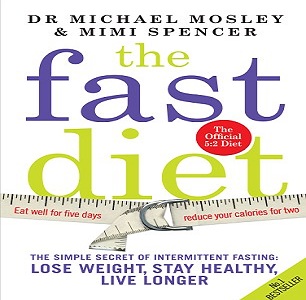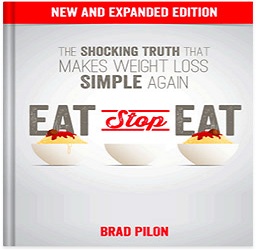The Skinny on Fast Diet
The Fast Diet is an overall health and weight loss diet that emphasizes fasting during certain days of the week. So, fast means dietary restriction and not speed!
Breaking the myths of traditional fasting, Michael Mosley came up with a diet plan, introducing intermittent fasting, such that people whose obesity levels continue to soar, even after trying standard dietary advices.
Based on the work of leading scientists from around the world, he provides it as an alternative to other diet plans.
Intermittent Fasting does not mean stopping eating entirely. It means reducing the amount you eat, but only for quite short periods of time.
Scientific trials of intermittent fasters have shown that it will not only help the pounds fly off, but also reduce your risk of a range of diseases from diabetes to cardiovascular disease and even cancer. “The scientific evidence is strong that intermittent fasting can improve health,” says Dr. Mark Mattson, Chief of the Laboratory of Neurosciences, National Institute on Aging, and Professor of Neuroscience, Johns Hopkins University.
Mosley himself tried this “intermittent fasting” diet when his doctor showed him that though he was only a few pounds overweight, his cholesterol was high and his blood sugar was headed in the wrong direction. He writes that he knew fasting would be difficult, but his hunger pangs passed quicker than he expected.
He also felt that fasting sharpened his senses and his brain. Plus, the diet delivered all the results he hoped for.
The Fast Diet book entails Michael Mosley’s experiences of trying different forms of intermittent fasting, before settling on what he says is a 5:2 regime. Apart from himself he also includes case studies of other people who tried it.
With 5:2 intermittent fasting you eat normally five days a week and diet two days a week, cutting your calorie intake for those two days to a ¼ of their normal level. This means that on, say, a Monday and a Thursday you will eat 500 calories if you are a woman, 600 if you are a man.
He promises that, if you stick to this plan then you should lose around 1lb (0.46kg) a week if you are a woman, slightly more for a man. Success also depends on not over-eating on your normal days.
There is no rule as to what or when you must eat on the fasting days.
Since calorie intake is limited — 500 for women and 600 for men — it makes sense to use your calorie budget wisely.
Try to focus on nutritious, high-fiber, high-protein foods that will make you feel full without consuming too many calories. Soups can be a great option on fast days.
There is no specific, correct way to eat on fasting days. You have to experiment and figure out what works best for you. You may feel hungry or weak during the first fasts but gradually your body will cope and adjust with this diet system and provide you marvelous benefits!
It is though, easier to follow than a continuous calorie restriction!
Fasting obviously provides bundles of health benefits, so Michael Mosley has tried to create diet plan for you, that is well tested and tried. His book is the right choice for you, if you’re disciplined enough and can bear the extreme dietary restrictions of this diet plan, you should go ahead.
Health benefits may include drop in insulin levels, increase in growth hormone levels, better heart health, improved cognition and reduction of oxidative stress. Cells also initiate important cellular repair processes. The body relaxes, as the digestive system gets rest. Clearer skin and detoxification in the body are also manifested along with weight loss!
Cost isn’t really a factor for this diet, given that you’re eating normally most days. There’s a good chance you’ll wind up buying fewer foods on fast days, and thus spend less on your grocery bills
Side effects may include:
- Headaches, low blood sugar, and fatigue.
- Mood swings, irritability, and loss of energy.
- Lack of mental focus, and extreme hunger.
- Day time sleepiness
Those who should avoid this diet system of intermittent fasting:
- Individuals with a history of eating disorders.
- Individuals sensitive to drops in blood sugar levels.
- Pregnant women, nursing mothers, teenagers, children and individuals with type 1 diabetes.
- People who are malnourished, underweight or have known nutrient deficiencies.
Women who are trying to conceive or have issues with fertility
Introduction to The 5:2 fast diet :
Eat stop eat, is a diet plan developed by the diet guru, Brad Pilon, who understands the psychology of a dieter and has made it flexible enough, not to interfere with your energy levels, or hinder your daily work schedule. You might be curious to know how?
Intermittent fasting is the basic approach that he follows but in a better way! There are many approaches to intermittent fasting like, 16/8 approach, 5:2 diet system, alternate day fasting etc. This plan by Brad Pilon is like a breath of fresh air, in this crowded market of fasting diet plans.
All you need to do, is to eat healthy to satisfy your tummy, but insert a non eating window (fast) of 24 hours once or twice a week, however it may suit you, or your body may be able to cope with.
This diet promises to offer you all the health benefits that any intermittent fasting plan would :
- Lose weight from your body fat
- Decrease inflammation
- Improve metabolic profile
- Improved insulin sensitivity
- Reduced need for obsessive compulsive eating
Fasting for as little as 24 hours has been shown to drastically reduce your insulin levels while increasing your Growth Hormone levels.
No need to worry that whether or not will you be able to fast for complete 24hours or not! Brad Pilon in his plan, even relaxes that for you.
There is still a benefit to fasting for 16 hours, just as there is no real harm in fasting for 30 hours.
With Eat Stop Eat here is no mandate to stop eating the foods you love, to clean out your kitchen or to never eat carbs or fat again.
There is no need for cheat days or binge days. In fact Eat Stop Eat does not involve binging, guilty feeling about food, or using fasting as a form of punishment.
Fasting, is not complete starvation but he allows you to drink the following liquids when fasting:
- Water
- Black Coffee
- Black Tea
- Herbal and green teas
- Diet Soda (in moderation)
- Sparkling Water
- Or any drink that is zero calories.
Eat stop Eat is the perfect way to kickstart your journey on intermittent fasting, since it goes back, to our ancestors and their natural cycles of high and low calories. Being backed by scientific evidence a sto how fasting benefits the human body, he has made this approach exteremely flexible!
Does it work?
It works because when you are in a “FASTED” state, your body has no new nutrients to feed on, SO, in order for it to get you energy, it goes for your stored FAT RESERVES FIRST.
Now, if you are in a fasted state TOO LONG, it’ll eventually go after muscle. But the eat stop eat book will tell you how long is too long, and how short is too short.
How is it different?
No counting of calories needed, on fatsing days.
No need to spend extra bucks on shopping, for very low calorie recipes, to feed yourself on fast days! It better to be completely free, of all such hassles rather than feel deprived yet eating too!
Imagine, you’re munching on a chocolate bar, and are told to stop after eating some of it! You will agree that it’s insanely difficult! Rather not take even a single bite altogether.
Eat stop Eat saves you from this disaster, of keeping a check on your eating, on fasting days. You fast according to your ability, not feeding yourself for a window of 16 to 24 hours!
Find yourself, Liberated, and Free of the miserable condition where your daily schedules and work might suffer because of being entangled in fast diets like 5:2 approach.
This approach will rejuvenate you cells inside out, and burn your fat, making you relieved of food obsession!
It prevents your weight from rebounding back, as it is a more resilient approach to intermittent fasting. When any plan is user friendly, you have maximum chances of sticking to it! Adopt it as a lifestyle and reap the benefits!
Apart from all that is mentioned above, your queries related to your hormones and what would happen within your body, precautions etc have beet finely written in detail in his book. You are not wandering in the dark, like the 5:2 diet that leaves you unguided about what exactly to do on fasting days.
Here you don’t need t o buy any additional cook book!
The opportunity is at your doorstep, you just have to see that you don’t have any of the health issues where fasting cannot be done, you are ready for this diet plan, which will not be a burden on your wallet too!
Thus, bank on this very fair enough deal. He offers a complete money back guarantee within a span of 60 days, if you fail to see the results. This is enough to boast about the plan. They provide you a free starter’s guide along with the diet plan book.
We recommend this for one very strong reason, that you should adopt a plan that you can stick to in the long term, to reap its full benefits. It doesn’t interfere with your everyday life. So you can stay lean in the long run.
This is the one that gives you the FREEDOM you’ve been looking for!
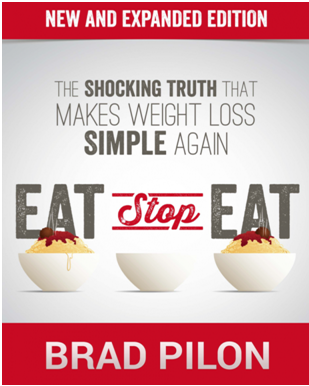
Amazing results of ‘Eat stop eat’ !
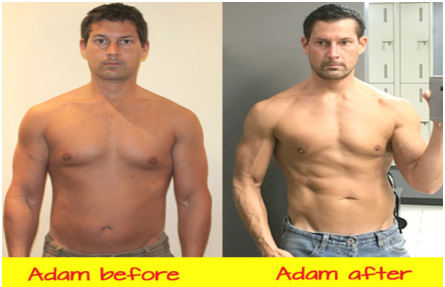
SPONSORED: Why "Eat Stop Eat" diet plan is the perfect way to kickstart with "intermittent fasting"?
Quite evident from the name itself, intermittent fasting is a healthy eating style where you fast for a set period of time and then followed by a period of consuming filling and healthy meals. It is fasting and feasting intertwined in a way to give you potent health benefits!
Depends upon which plan you would be able to follow, or would suit you! Fasting may range from 12, 16, or up to 24 hours for a day or two, stuffed in your normal diet regime. If done in the right manner it manifests the most coveted changes in your health!
Being backed by scientific support and anecdotal proof, cutting off dietary intake for a stipulated period of time does wonders for you!
Modern humans in most parts of the world follow a “three meals plus snacks” eating pattern daily, but this paradigm is actually somewhat of an anomaly when thought of in terms of human evolution.
Humans evolved to function well physically and mentally even amid fasting conditions. Present-day scientists are exploring how intermittent fasting may yield benefits in terms of lower chronic disease rates, reduction in neurological disorders, improved weight management, and a slower rate of aging.
Careful, supervised fasting can boost weight loss efforts.
Dietary restriction is an effective strategy for weight loss in obese individuals. The most common form of dietary restriction implemented is daily calorie restriction (CR), which involves reducing energy by 15-60% of usual caloric intake every day. Another form of dietary restriction employed is intermittent CR, which involves 24 h of ad libitum (pleasure) food consumption alternated with 24 h of complete or partial food restriction. (NCBI)
“Intermittent fasting is safe when performed properly, and can change the function of cells, genes and hormones – and is therefore beneficial for weight loss and disease prevention.”
This is because fasting gives our bodies an opportunity to “initiate important cellular repair processes, and can change hormone levels, which makes stored body fat more accessible – for energy and to burn,” says Clark. (Dietitian Robbie Clark)
Valter Longo is a scientist at the University of Southern California who believes that, because of this process, periodic fasting can help people stay healthy. Faulty immune cells, for instance, could be pruned back so that when a person starts to feed again, new cells are spawned from only the strongest and the fittest.
“Low-energy conditions such as dietary restriction and intermittent fasting have previously been shown to promote healthy aging. Understanding why this is the case is a crucial step toward being able to harness the benefits therapeutically,” said Heather Weir, lead author of the study, who conducted the research while at Harvard Chan School and is now a research associate at Astex Pharmaceuticals. “Our findings open up new avenues in the search for therapeutic strategies that will reduce our likelihood of developing age-related diseases as we get older. (Harvard gazette story)
Benefits of intermittent fasting:.
Intermittent fasting is as effective as any calorie restricting diet may be!
- Blood levels of insulin drop significantly, which improves blood glucose control and facilitates fat burning.
- Blood levels of the human growth hormone increases, which helps facilitate fat burning and muscle growth. Human growth hormone plays a key role in turning on your bodies fat burning furnace so it gets the calories you need to work and play from stored body fat. Studies show that fasting can increase your body’s production of growth hormone by 1,300% in women and 2,000% in men!
- The body undergoes important cellular repair processes – such as removal of waste products from cells.
- Decrease in triglyceride and LDL cholesterol levels, which are all associated with a reduced risk of type 2 diabetes and cardiovascular disease.
- Beneficial changes in gene expression, related to longevity and protection against inflammation and disease. Fasting is believed to reduce the levels of Igf 1 in the blood, a growth hormone that causes accelerated aeging and can cause cell divisions like those found in cancer
- Fasting intermittently can also prime your cells so they can better handle stressful insults. One study says that a break from eating jolts cells into a minor stressful state, making them more capable of later fending off other types of stress (like the type that can lead to disease) NCBI
- Finally, of course carefully supervised fasting leads to weight loss!
Those who should not indulge in intermittent fasting:
- Suffering from adrenal fatigue. Adrenal fatigue can occur when you are under a lot of intense stress, have suffered an infection or illness, or are severely sleep-deprived. Adrenal fatigue makes you very tired, and it affects the way you metabolize your food.
- Pregnant or nursing. To sustain the increased caloric needs of growing baby and/or milk production, you should be eating regularly.
- Have or are recovering from an eating disorder. It’s important to have and maintain a healthy relationship with food. If you have an eating disorder, please seek professional help. If you are recovering from an eating disorder or have struggled with eating disorders in the past, please do not use intermittent fasting as a weight-loss tool.
- Are a child. Children are growing while they sleep and need a good quality breakfast to replenish their spent energy.
- Consult your healthcare professional prior to beginning a fast if you have any condition you are concerned will be negatively affected by a change in diet.
This massive dude lost weight with intermittent fasting. The picture clearly reflects the magic of intermittent fasting. He went on intermittent fasting with a low carb diet and, as a result, he lost 40 pounds.
Yes, you read it right – 40 pounds.
He used to eat food that is high in fiber and low in calories such as spinach, wholegrain, and non-starchy foods. He lost weight in the span of 10 weeks. (source pinterest)
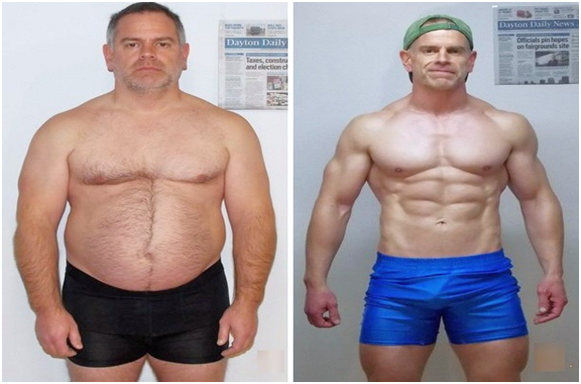
Everything about intermittent fasting!
Women’s bodies are sensitive and before trying anything new, we want you to start it with conviction and goodwill. There a long list of the promised health benefits if intermittent fasting, but does it do justice to women just like men? If this thought has crossed your mind, just read below, to understand how this system of eating can be wisely utilized for women too!
What you should know:
Women respond more strongly to starvation signals than men, and if the body senses it is being starved, it will ramp up the production of the hunger hormones, leptin and ghrelin. When they experience that feeling of insatiable hunger after not eating enough, what they are actually feeling are these hormones. This is how a woman’s body protects the potential fetus. These hormones function even if a woman is not pregnant (not to the same extent).
- Scientific researches show that prolonged and big calorie deficit created through too much exercise, and quick loss of body weight all may lead to different forms of menstrual dysfunction in women. This is usually seen in women who are dieting for long periods of time as well as in female athletes who are not purposefully dieting, but unable to meet the caloric needs of their rigorous athletic regimen.
- However, it’s not just prolonged periods of time in large calorie deficits that are the problem as having too little fat may be a problem for some women. In 1974, scientists found that the maintenance of normal menstrual function was related to a critical level of 22% body fat.
- Study on elite national level female athletes has shown that the combination fat levels with a large calorie deficit of low body can result in amenorrhea (absence of their monthly period), as well as deceased leptin and estradiol levels.
Minimal levels of body fat, combined with long-term calorie deficits, and possible mild protein malnutrition can result in marked hormonal disruptions!
Even though there are recognizable differences in how women respond to dieting and fasting, there is no evidence to suggest that women should not fast.
This is not to say that women can haphazardly use as much fasting as often as they like in an attempt to lose weight. This is more evidence that if fasting is to be used on a regular basis as a method of weight control then it must be done with some common sense.
Women should go in for a RELAXED version of intermittent fasting, which means fasting for not more than two days a week. Being prudent while following this system of eating can bear for you the fruits you’ve been waiting for!
You will reap benefits like of lower chronic disease rates, reduction in neurological disorders, improved weight management, and a slower rate of aging, provide rest to your digestive system, detoxify and lot more!
So if you’re sick and tired of quick fixes that make you less healthy and weaker over the long haul and you want to gain the benefits of intermittent fasting – to feel good, get stronger, and like the body you see in the mirror – then do IF, the smart way!

Sumaya Kazi has got the most benefit from intermittent fasting. She claims that she has lost more than 50 pounds in just 7.5 months. She has lost more than 10% of fat and around 40 inches from her body.
This is a phenomenal achievement by Sumaya Kazi. She got all these excellent results with the help of intermittent fasting. She revealed that even she did not exercise for the first three months and she was able to lose weight.
Women and intermittent fasting:
Is this diet backed by any research?
“There are loads and loads of animal studies going back over 80 years, human studies now going back over about five or six years. And I’ve counted 11 clinical trials of intermittent fasting. There are also [observational] trials on Muslims [who fast] during Ramadan.”
(Mosley)
Who benefits from intermittent fasting?
As well as offering a fresh approach for people trying to lose weight, IF has been developed by scientists wanting to help people reduce their risk of developing diabetes, dementia and cancer
- IF has been most extensively studied in volunteers who are obese or overweight. In a recent study of 115 overweight women, those who restricted their calories two days a week lost more fat and had a greater improvement in biomarkers that relate to breast cancer risk than women doing conventional daily dieting.
- The benefits in people who are not overweight are less clear because there have been fewer studies. In one experiment, a number of fit young men were asked to practice IF without losing weight for a few weeks. During that time they saw improved insulin sensitivity, a marker for reduced diabetes risk
- Studies of IF in animals have shown that it reduces risk of dementia. Human studies have just started.
- Fasting also has a spiritual dimension and has been advocated by most of the great religions
What are the most common side effects of this diet and how can they be avoided?
The commonest side effect is feeling hungry, particularly when you first start.
Some people find it hard to sleep on a relatively empty stomach. If so, it is recommend keeping calories aside for a late night glass of milk or snack.
Some people may experience headaches or constipation, particularly at first; these can generally be alleviated by drinking lots of calorie-free liquids and eating foods that are rich in fiber.
Can I exercise on fasting days?
Yes, you can exercise.
We analysed a group of dieters at our research centre, who exercised 3 times a week. We also let people choose whether to exercise on feast or fast days, and they chose equally.
During the first week participants reported low energy, but it bounces back. Some people even report more energy on fast days.
It’s actually advisable to exercise because you lose more weight if you do so – your muscle mass will stay high and, as a result, so will your metabolism.
Participants also tended to lose more weight if they exercised in the morning, before eating. Then when their post-exercise hunger surge came (when the body is rebuilding) they would eat their 500-calorie meal. If you exercise after eating, you still get your hunger surge and are more likely to cheat.
What foods to eat on the fasting days?
Types of food
- Animal protein (if you want) – beef (e.g. sirloin steak), pork (e.g. lean pork loin, fat-free ham, bacon), chicken breast, fish (e.g. tilapia, salmon, tuna, mackerel, shrimp), eggs (boiled or poached)
- Vegetables – aim for a wide variety – different colors, textures, tastes, shapes. E.g. asparagus, avocado, broccoli, broccoli rabe, cabbage, carrots, cauliflower, cucumber, edamame, eggplant, fennel, green beans, unlimited leafy greens (spinach, kale, chard, mustard greens, salad leaves, watercress), leeks, mushrooms, bell peppers, scallions, snow peas, a handful of cherry tomatoes, zucchini. Eat a wide range of different-colored plants, No fixed guidelines about eating them raw or cooked – “have both, often”. Be cautious about starchy vegetables as they tend to have a higher GL and calorific value – proceed with caution and don’t add butter. Eat onions in moderation because of their GI value.
- Fruit – citrus fruits (tangerine or grapefruit in particular), a watermelon slice, an apple (eat the skin, seeds, and core), a handful of berries such as blueberries or a couple of strawberries, a fig, a small banana, a small mango
- Nuts – almonds, cashews, coconut flakes (unsweetened), pistachios. Eat in moderation as nut calories quickly add up
- Seeds – sunflower
- Soup – light broth or miso soup
- Carbohydrates – whole-grain bread or tortillas, whole-grains (oats, bulgur, couscous, quinoa, brown rice/brown basmati), beans and lentils. As an alternative to pasta or wheat noodles, try shirataki noodles
- Dairy – low-fat or fat-free milk, cheese, cottage cheese, cream cheese, or yogurt
- Flavors – including chili flakes, cornichons, cumin, fresh herbs, garlic, ginger, jalapeños, lemon juice, mustard, olives, pepper, soy sauce, Thai fish sauce, vinegar, wasabi. The cookbook refers to these non-carb flavor enhancers as the “fantastic five”: lime juice, soy sauce, fresh ginger, garlic, and Asian fish sauce
- Use agave as a sweetener if required, as it’s low-GI. Or try a sprinkling of coconut.
- Choose your own preferred way to consume your 500 or 600 calories – could be one meal a day, breakfast and dinner, two meals with some snacks in between, or your own preference. On purely theoretical grounds, a longer period without food (e.g. breakfast and dinner with a 12-hour break in between) should produce better results than one when you eat smaller amounts more frequently. Aim for as long a fasting window between bouts of eating as possible, as this is where many of the benefits of intermittent fasting lie.
What drinks can be consumed on a fasting day?
You can drink anything that has no calories/low calories. This includes coffee and tea. Milk is generally a healthier drink than, say, orange juice, being rich in protein and relatively low in carbohydrates. So that would still be a better option than juice. Just keep the calorie count within limits!
Can I fast if I am feeling unwell?
Best not to. Fasting will stress your body, that seems to be one of the ways that it helps (stress provokes repair), but you shouldn’t over stress.
What foods have to be avoided during the fasting days?
- Stay within your calorie limit
- Limit or avoid high-glycemic GI or GL foods. Watch out for high-glycemic potatoes and many fruits, as well as dried fruits such as raisins and dates, which can spike your blood sugar and are best left for the days when you are eating freely. Fruit juices also have a high sugar content
- Avoid starchy white carbohydrates (bread, potatoes, pasta). It isn’t’t expressly discussed in the book, but implied that you should avoid sugar on these days; the cookbook says that as a rule you should avoid white carbs on a fast day
- There are no guidelines on artificial additives and artificial sweeteners, but in general the book recommends “real” foods for the fast days so we assume these shouldn’t be included
- Avoid full-fat dairy and butter
- Remove the skin and fat from meats before cooking
- Avoid alcohol – it merely provides empty calories
- Avoid processed foods – they tend to have hidden sugars and not contain much nutritional value
- Meal replacement shakes – the authors aren’t great fans and think real food is better, but if you find they help you can use them – choose a brand that is low in sugar
Will it put me into starvation mode?
This is another very common myth. The initial response of your body to a reduction in calories is to increase your metabolic rate. This is because, in our hunter-gatherer past, survival in times of food shortage would have depended on our becoming more active, going out to hunt and look for food. Only under conditions of extreme calorie deprivation, when we have been for weeks without enough food and our body fat has fallen dramatically does the body go into “starvation mode”. IF is not the s ame as crash dieting. Starvation mode does not happen if you cut your calories for a day!!
How do I maintain my weight once I reach my target?
Once you’ve reached your target weight or just a shade below, you can consider adopting the Maintenance Model to stay at your current weight and keep the anti-aging benefits of occasional fasting.
- Fast on only 1 day a week or once every 8-10 days
- Or consider adapting your consumption on non-fast days to eat more calorie-dense foods.
The Fast diet FAQs:
- “While there are health benefits to intermittent fasting, like with the 5-2 diet, the one concern I have with this 5:2 diet is they have no rules or regulations for the five higher-calorie days. They even say, “no food is off limits, as long as the total calories are within the designated amount.” With this diet you eat 500 calories a day twice per week. Women eat about 2,000 calories per day for the other five days, and men eat about 2,400 calories per day the other five days. Eating this way could encourage behaviors like binge eating and eating a lot of unhealthy foods, like high-calorie, high-fat ice cream, burgers, and fried foods. People may assume that just because they fast twice per week they can turn around and eat absolutely whatever they want the other five days, as long as they stay within their calorie ranges. In my opinion, this does not lend itself to a healthy relationship with food.” (Christy Shatlock , registered dietician : Florida)
- The 5:2 and similar intermittent-fasting diets are said to be easier to follow than traditional calorie restriction, and an advantage is that you do not have to exclude any food groups. Many see the eating regime less as a ‘diet’ and more as a way of life that can help them maintain their weight loss in the longer term. All the headlines for the 5:2 diet, and similar intermittent-fasting regimes, claim that calorie restriction may be linked with. (Kerry Torrens)
- The Fast Diet is not recommended for diabetics or prediabetics because the drop in caloric intake could put them at risk for hypoglycemia, or low blood sugar. Also, diabetes medication would require adjustment on this diet, according to one expert.
The The Fast Diet is ranked #35 in Best Diabetes Diets.
(https://health.usnews.com/best-diet/fast-diet/reviews )
- Experts noted their concern about the Fast Diet’s long-term sustainability and lack of guidance. Those who suffer from severe short-term calorie restriction might find it hard to follow. However, the diet could work for extremely busy people and those struggling to cut calories on a daily basis, said one expert, who called it “relatively easy to follow compared to the diets that required structured meal choices or significant food preparation.”
The The Fast Diet is ranked #22 (tie) in Easiest Diets to Follow.
(https://health.usnews.com/best-diet/fast-diet/reviews )
Findings on the ‘fast diet’ published in reputed journals:
- A 2013 study in the journal Metabolism found that obese people who alternated days of fasting with either high-fat or low-fat diets lost weight and inches from their waist and reduced some heart disease risk factors. (NCBI)
- In a 2011 study published by the American Association for Cancer Research, researchers at Genesis Prevention Center at University Hospital in South Manchester, England tested the effects of three kinds of diets on 115 women. One diet looked like the Fast Diet (five days of normal eating and two days following a calorie-restricted, low-carb diet each week), another restricted carbs two days a week but had no calorie restrictions and a final group followed a calorie-restricted Mediterranean diet for all seven days of the week. After four months, participants following the intermittent low-carbohydrate diets lost an average of 9 pounds, while those on the Mediterranean diet lost an average of 5 pounds.
- In a randomized trial of 107 overweight or obese premenopausal women, researchers found that participants who followed an intermittent food energy restriction plan (25 percent restriction two days a week) lost a comparable amount of weight to the participants who followed a continuous energy restriction plan. After six months, participants following the intermittent calorie restriction plan lost an average of 14 pounds each. Results were published in 2011 in the International Journal of Obesity.
- A study published in the July 2013 issue of Physiology & Behavior doesn’t discuss intermittent-day fasting, but it addresses the concern of overeating after fasting. Researchers at Cornell University either fed breakfast to or withheld breakfast from a group of student volunteers. They found that those who skipped breakfast reported being hungrier than those who ate breakfast. They also ate more at lunch. Still, the amount they ate didn’t fully compensate for the missed meal. Volunteers who skipped breakfast consumed 408 fewer calories over the course of the day than those who ate breakfast.
- Studies on every-other-day fasting show mixed results. One published in 2010 in the Nutrition Journal suggested that the technique was effective among a group of obese patients. A group of 16 participants ate only one meal – lunch – every other day, and they were limited to about 500 calories. That’s the same amount of calories women consume on the Fast Diet’s fasting days. On the days when the study participants were not fasting, they were not constrained to any rules. Over the course of eight weeks, the participants lost an average of 12 3/10 pounds.
Expert reviews:
- I really like the fast diet. I’ve been on it seven weeks and have lost almost 8 lbs and 2 inches off my waist. I enjoy the fast days because I don’t have to think about food. Odd huh?
I’m a snacker and it’s nice to know “today I don’t snack”
I will stay on this program indefinitely. It works for me.
( Roy Christopher)
- I have been following the Fast Diet for 9 months and have lost 20 lbs, I have been able to maintain the wgt. Loss and Iam extremely happy with the results. This food plan has been the easiest program I ever participated in.
My lab results are also improved.
( Marie Nemetz)
- This is more than a diet, and you can easily start it after reading the first few pages. The book describes intermittent fasting, and it describes in full detail the beneficial effects it can have on your body. What drew most of my attention was improved brain function. After trying it a while I discovered it really works. I sleep better and I can concentrate more at work. After my last blood work, the doctor said my blood was completely normal other than my cholesterol being too low. He cut my prescription for statins in half. Of course, my weight has fallen, too. My BMI is back under 25. This book is well documented and describes scientific studies that are complete and which ones are still underway. It does have several recipes in case you don’t already know how to be prepare healthy meals, although some of the ingredients are difficult to find. You only have to partial fast two days a week. Although the author says you can eat anything else the rest of the time, you get faster results sticking to healthy meals. This really worked well for me. (Well)
- The diet and book are both based on personal experiences of doctor and science journalist, Michael Mosley. He produced a BBC documentary titled Eat, Fast and Live Longer, which prompted our interest in the diet. The diet is relatively easy to follow and effective. Unfortunately, the book makes it sound much more complicated than it is. (Short review: skip the book; watch the documentary).The premise of the diet is that fasting 2 days a week creates multiple health benefits: weight loss, reduced risk of diabetes, cardiovascular disease and possibly even cancer. Besides calorie restriction, the diet also makes a person more aware of true hunger pangs versus emotional eating.
Mosley’s definition of a fast is actually quite generous — 500 calories/day for women, 600 for men. Dieters fast for two nonconsecutive days each week, and are free to eat as they please on the remaining 5 days. (Joan)
- There are many ways to lose weight from counting point to micro-managing carbs. But almost all of them involve eating less calories on a daily basis. The result – you lose weight but let’s face it the prospect of eating less every day gets old. And in many cases weight that is shed is quickly put back on.
Enter Dr. Michael Mosley with “The Fast Diet”. Dr. Mosley a science researcher, investigated how fasting can result in enormous benefits such as increased longevity, lower blood pressure, improved cholesterol and much more. He presented his findings in the British television BBC special documentary “Horizon: Eat, Fast and Live Longer”.
Instead of a pure fast Dr. Mosley found that you could enjoy many benefits from eating a reduced calorie diet just 2 days a week and eating normally the other 5. For women about 500 calories and for men about 600 on the 2 lower calorie days. Based on the documentary thousands of British people tried eating this way and found it to be fast, effective and much easier than a traditional diet. It’s a revolutionary weight loss method! (Lee Melott)
- I started on Valentine’s Day, and in just 2 weeks, I lost 8.5 pounds. This book contains info on the science of fasting, what to expect while fasting, what to eat, and many more great tips. I like it so much, I also bought it on audio book. You may want to buy an extra copy, because your friends will want one. (Kathleen)
Positive customer reviews:
- It was too hard to keep up. Like all diets, I couldn’t stick to it and it would not have been a natural way for me to live. I think it was healthy enough and better luck to those who have more willpower than I. (Brook)
- I chose this diet as a recommendation from one of my physicians. It’s great for people who have that fortitude not to eat but I didn’t like that hungry feeling and going that long without eating. I’ve lost weight before by doing more exercise, burning more calories and still eating what I want. (Maxmom)
- Daily fasting is much easier. Simply restrict your eating window to at most 8 hours daily and eat whatever you like within that window. No having to worry about it, is it a fast day or not and no having to count calories and feel deprived. I’ve lost 70 lbs simply by scheduling my eating to a 5 hour window. (Laurel)
- I found restricting myself to 500 calories impractical, because of the obsession with food that the author mentioned. You are constantly thinking about hat you’ve eaten, how many calories that represents, how many you have left, what that means you can eat, when would be a good time to eat it, how long you have to wait. I found it’s easier to eat nothing. If you can’t eat, the distress is removed. A Cup-a-soup before bed is a pleasant reward that gives you something to look forward to. (Greg)


